Grandmother Fills the Gap From Closed Pools and Camps While Single Mother Works Through COVID Summer
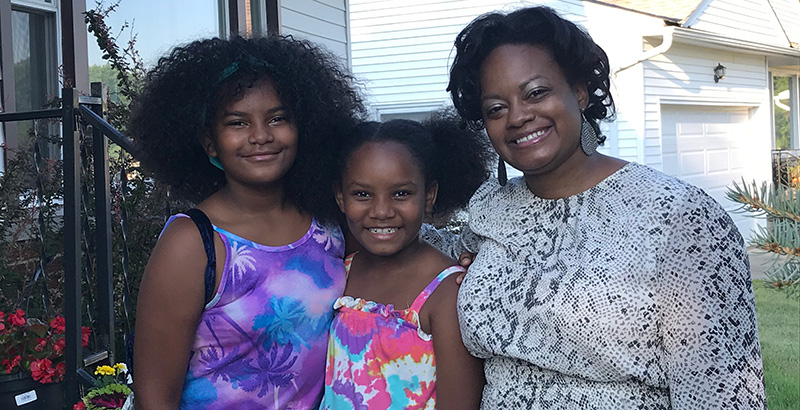
Melody Glendell considers herself lucky.
Glendell, 42 and a single mother, had to work full time even after schools closed. But while co-workers panicked over child care, she had a backup plan to cover her two girls, Alexandra, 10, and Aleena, 8, known as Ally and Apple.
Her ex-mother-in-law, Flora Grant, the girls’ grandmother, was able to take Glendell’s daughters during school hours and even after school when the girls would normally go to a local Boys and Girls Club, which was also shuttered by COVID-19.
Now that COVID has also wiped out a YMCA day camp that was the core of the girls’ summer plan, Grant is stepping up again. Starting in late June, she’s taking Ally and Apple every weekday for the summer.
“She still kept my kids because she loves her grandkids and she wanted me to work,” says Glendell, who divorced in 2016. “But it’s really hard when you don’t have the child care. And, like, the Boys and Girls Club — I depend on that for my afterschool care, so when it closed, what do I do?”
It was an easy decision for Grant, 81, since both parents are working. Ally and Apple, she says, “had to go somewhere.”
How much child care has fallen to grandparents during the pandemic is unclear, particularly since many parents have also been working from home while schools and camps have been shut down. But census data have long shown that grandparents are the primary source of non-parent child care nationally, especially when mothers work.
Because senior citizens are at much greater risk of having serious COVID-19 cases, children like Ally and Apple will have to stay even more isolated than other children, even after being cut off from friends at school and the Boys and Girls Club the past three months.
“She is cautious about allowing them to go out on their own, because there are other kids on the street and it’s hard to tell kids to social distance when they want to play,” says Glendell. “It’s hard to explain to a child why you can’t play with your friend that you used to play with.”
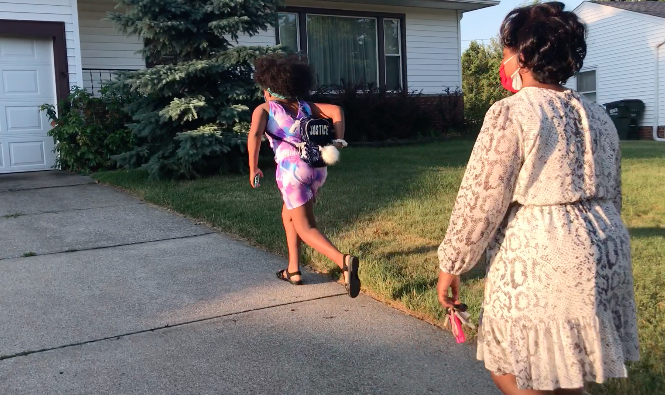
7:00 a.m.
Ally Grant races up the driveway of her grandmother’s house, pressing her ear against the garage door as she taps on it to get the attention of King, the dog sleeping inside.
“He’s a black Lab,” she says. “He loves me so much.”
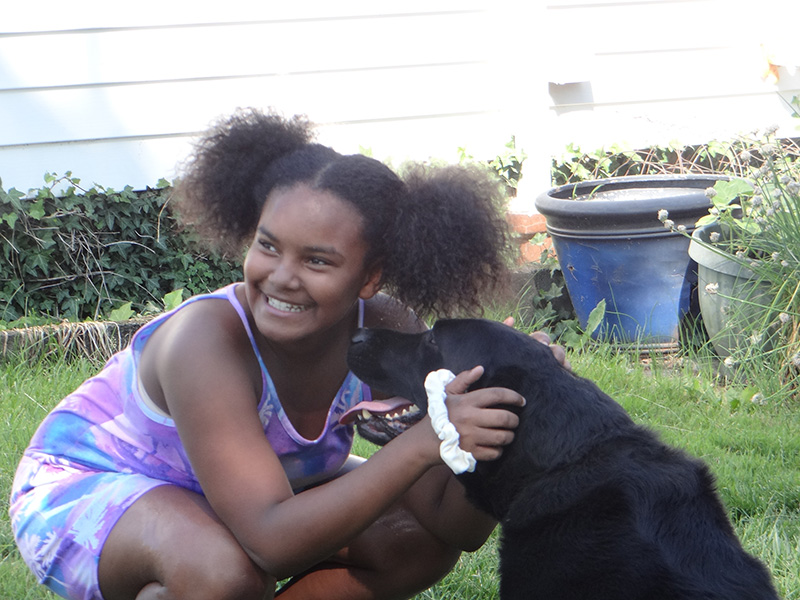
Glendell and the girls have arrived a few minutes early at Grant’s ranch home in the Cleveland suburb of Warrensville Heights, about a 10-minute drive from Glendell’s home in Cleveland, so the three wait on the porch a few moments for her to come out.
It’s their first summer day with Grant. Though they have been done with school for a few weeks, they have stayed with their father since May, only making quick stops to say hi to their grandmother.
Ally points to a house across the street and says she has friends who live there. Normally, they’d all play basketball together or jump on a trampoline. Not this year.
“They can’t really play because of COVID,” Glendell says.
“Sometimes we see them when we’re playing in the yard,” says Ally, by far the more outgoing of the two girls. Though she has less chance of being a carrier than adults, she’ll just wave and say hi from across the street this summer.
“Since we’re with my grandma, we can’t get her sick,” she says.
As she and her sister Apple start talking about things to do this summer — walking King, cooking, making puzzles, meeting friends at a distance (with parental supervision) — Ally starts mentioning how summer camp at the YMCA will probably have restrictions.
“There’s no YMCA camp,” Glendell interrupts. “Remember, I told you it’s totally done.”
Ally shrugs.
“OK,” she says. “Then we’ll just have more time with Grandma.”
7:30 a.m.
“See you guys later!” Glendell calls out as she crosses the street to get back in her car. Grant and Ally wave to her from the front porch.
Glendell has half an hour to head downtown, where she works as an accountant for the Public Utilities Department of the City of Cleveland, which has its own electric power system along with water service. Though she considers herself “just a peon” in the operation, she was considered essential when most businesses in Ohio were closed.
That led to a difficult few months when Metro Catholic, Ally and Apple’s elementary school, was closed. Normally the Boys and Girls Club would help all students at afterschool sessions with homework. But with school and the club both closed, more fell to Glendell. Though Grant could help with lessons, Glendell would have to pack in a full day’s learning for the girls after her 8-5 job.
It was too much, she says.
“I appreciate they were learning, but I feel like they should have closed everything or left everything open,” she says, so parents would not be pulled in two directions. “All of my free time with the kids, we spent on doing schoolwork. I have new respect for the teachers.”
For the first few weeks, she tried having her girls do lessons on their own during the day. But both Ally and Apple fell behind and their grades were suffering.
“Anything where you needed adult help, it wasn’t going well,” she says.
So Glendell took Thursdays off every week so she could spend the day catching the girls up on schoolwork.
“I was very tired. I didn’t have enough time, but I made it work.”
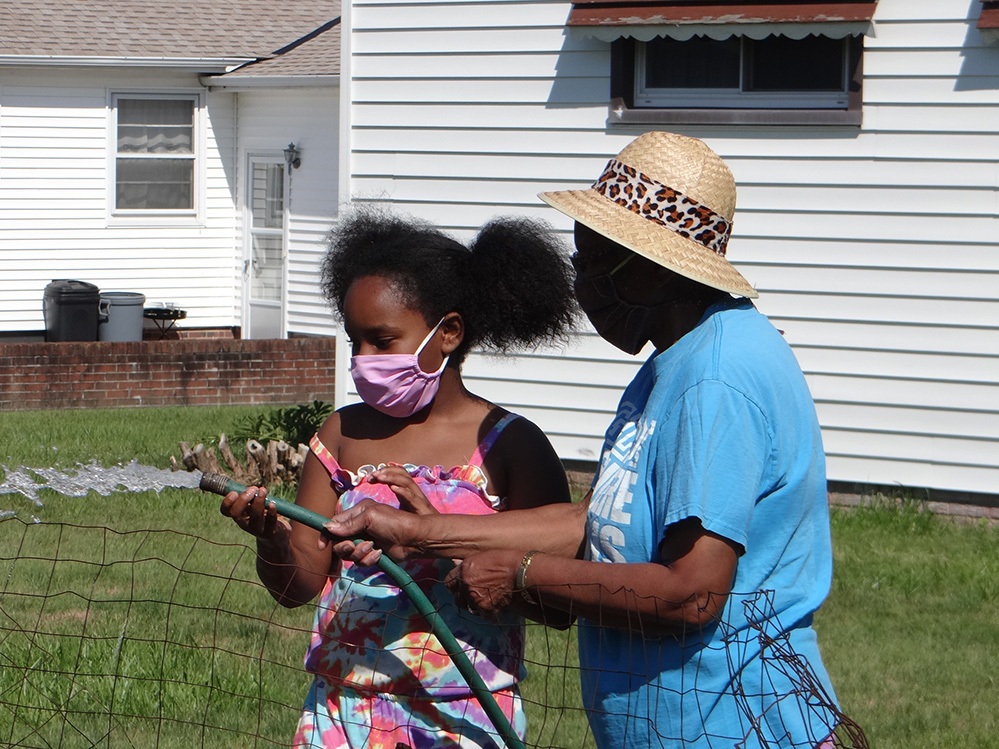
10 a.m.
Flora Grant scratches and digs at the dirt in her garden with a hoe as Apple looks on. She doesn’t have to dig deep to dislodge the grass seedlings invading her rows of beans, tomatoes and cucumbers.
“Why are you making the dirt come up?” Apple asks.
“See the grass here?” Grant asks. “If we don’t get this grass up now, it will grow real big.”
Without COVID canceling summer camp, the girls would be downtown using their free time after breakfast to play board games, draw, build things with Legos or just visit with friends — “all that good stuff,” Ally says.
Today, weeding quickly turns into watering the young plants. Moments later, the girls have their hands on the hose and are spraying each other with water, squealing at a cold spray on a day that is growing hotter by the minute.
“Don’t get all wet,” Grant scolds, though she doesn’t persist or intervene. A hose in her backyard might be the closest thing the girls have to swimming this summer.
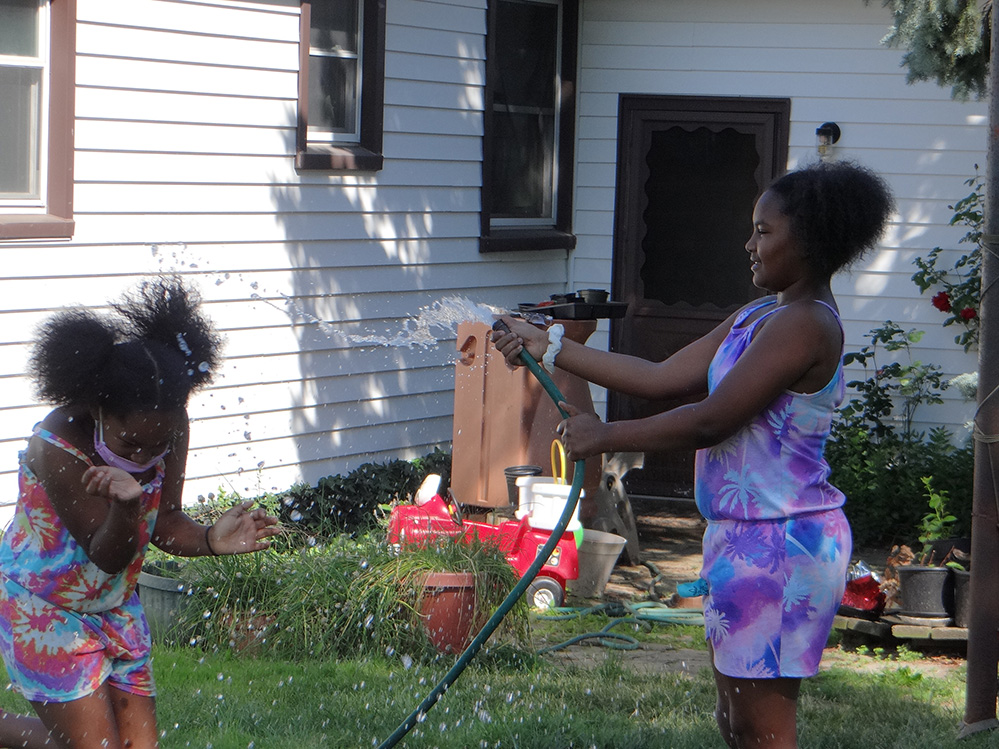
Local pools they have used other years are closed for the summer. The few that will be open threaten to have long lines. With the city limiting the number of people in pools and the time each person can spend in the water, it might not be worth the bother.
Ally is holding out home that the local YMCA branch will have its indoor pool open.
“I know that chlorine kills the coronavirus,” she reasons. “The problem is all the stuff on the decks and the doors.”
Grant thinks there’s a chance — even for swimming lessons like the girls have taken there in the past. The branch was closed for weeks but has started offering some classes again while checking people’s temperatures at the door.
She was the only attendee of an aerobics class a day earlier that used to have 36 people at each class.
“The people just haven’t come back,” she says. “It’s not like the young folks out in the bars and all that.”
Even with coronavirus concerns, she’d consider the YMCA safe.
“There’s nobody there,” she says with a laugh.
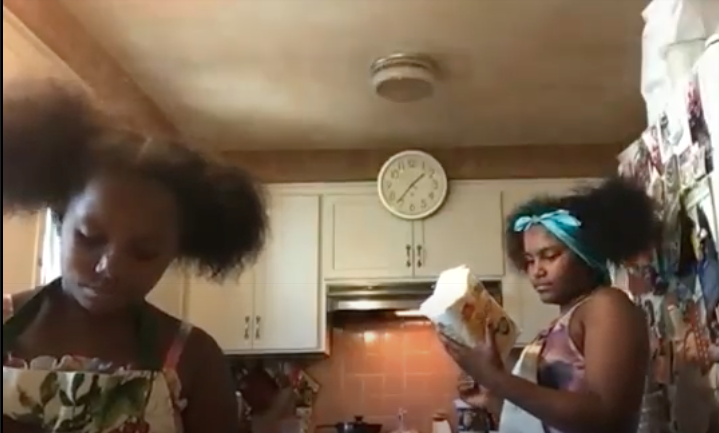
1:30 p.m.
“We’re going to make at least one batch,” Ally proclaims, as she starts reading off ingredients for sugar cookies.
Tuesday afternoons, like today, would be field trip days for the girls’ summer camp. Trips would include the zoo or the aquarium, or places with video games, go-karts or miniature golf.
Today, Grant has planned cookie baking for the girls, following giving King a walk and pulling out two bicycles for a ride around the neighborhood. The ride was cut short, though. Grant had fixed blown tires on one bike before today, but a tire on Ally’s bike sprung a leak after pedaling just a few houses away. It has to go back to the shop.
But as a regular baker — one with a reputation for great breads — Grant is prepared for cookies.
“We have everything,” Ally says, showing off each ingredient as she measures. “So, we have a fork and we’re going to beat the egg and the vanilla.”
Grant lets Ally make the recipe herself as Apple watches. It’s a stealth lesson, says Grant, a retired elementary school teacher. Beyond cooking being a basic life skill, baking is practice using measurements and fractions of things like a cup or teaspoon.
A recipe is also a perfect example of the “informational text” the Common Core learning standards started including in reading comprehension expectations a few years ago.
“Follow the directions,” Grant reminds Ally.
“They need to learn to read their directions,” Grant says later. “If they can do that, that would really be good.”
She’ll reinforce that skill later this summer when they sew masks for COVID safety. Grant made and donated many this spring and will have the girls help her make more over the summer. When they start, she’ll just hand them a list of instructions.
“They can read it to see if they can do it first,” she says. “And if they need help, I can give them a little help, a little push.”
Ally holds up the bowl with the flour, sugar, butter and eggs all mixed.
“This is our dough,” Ally says. “Now we have to put this in the refrigerator for an hour.”
4:30 p.m.
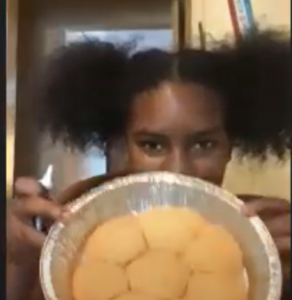
The cookies are a success. They even pass the test of veteran baker Grant, who tastes one from each girl “so it’s even,” Ally says.
“They came out very good,” Grant says, stressing that she just watched the baking from the side. “They did these cookies themselves.”
Ally has begun decorating hers with tubes of icing while Apple staggers into the kitchen, barely awake after a nap. She has a little congestion and both girls are on short on sleep, so they have piled comforters and pillows on the living room rug to catch up. They were up until 2 a.m. the night before taking the braids out of each other’s hair so it can be more natural for part of the summer.
Ally holds up a pie tin filled with cookies, counting them off one through eight.
“I already did mine, but these are for the jar, once they dry,” she says.
After putting an “A” for Ally on an earlier cookie, she squeezes out blue icing on a fresh one.
Apple, now more awake, makes her own “A” cookie and then mixes yellow, pink and blue icing on another.
“I think I’ll just eat this one,” she says. “It’s kind of messed up.”
Ally spies the colors: “Oh my gosh, Apple. What did you do?”
“It looks like a brown,” Apple says. “But it’s still really good.”

8 p.m.
Glendell sits in a folding chair in her backyard while Ally and Apple burn off their last energy of the day.
“It was a busy day,” she says. “It’s always a busy day when I work.”
Since picking the girls up from Grant’s house, they have had dinner and headed outside for the evening. Silliness is winning the night. Ally has been showing off her cartwheel skills and the two have been recording themselves on TikTok dancing to songs like “Rockin’ Robin.”
“They’re always energetic,” she says. “I think having the cookies gave them a little extra energy.”
Some nights, they’ll all read together or do crafts before she sends them to bed by 9 p.m. Tonight the weather’s good and they’re still taking a break from the school year. Glendell is still worn down from doing lessons after working full days.
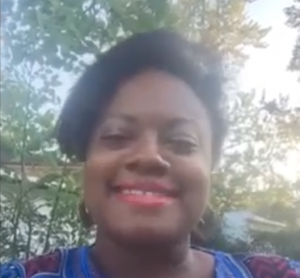
“Just the couple months were completely exhausting,” she says, hoping schools can return to a normal schedule. “I wouldn’t want to do that for the entire school year.”
She and Grant have reading plans for the girls this summer — reading Jack London’s White Fang as a companion to having seen the Call of the Wild movie. They’ll review some school lessons later in the summer. Glendell also wants the girls to read some of the dictionary.
“I know it sounds like a lot, but it’s really not,” she insists. Reading a few words and definitions builds vocabulary.
But mostly, her goal for the girls for the summer is “just relax.” That will include crafts like knitting and painting, but no stress.
“Just a good, healthy summer.”
Get stories like these delivered straight to your inbox. Sign up for The 74 Newsletter

;)
